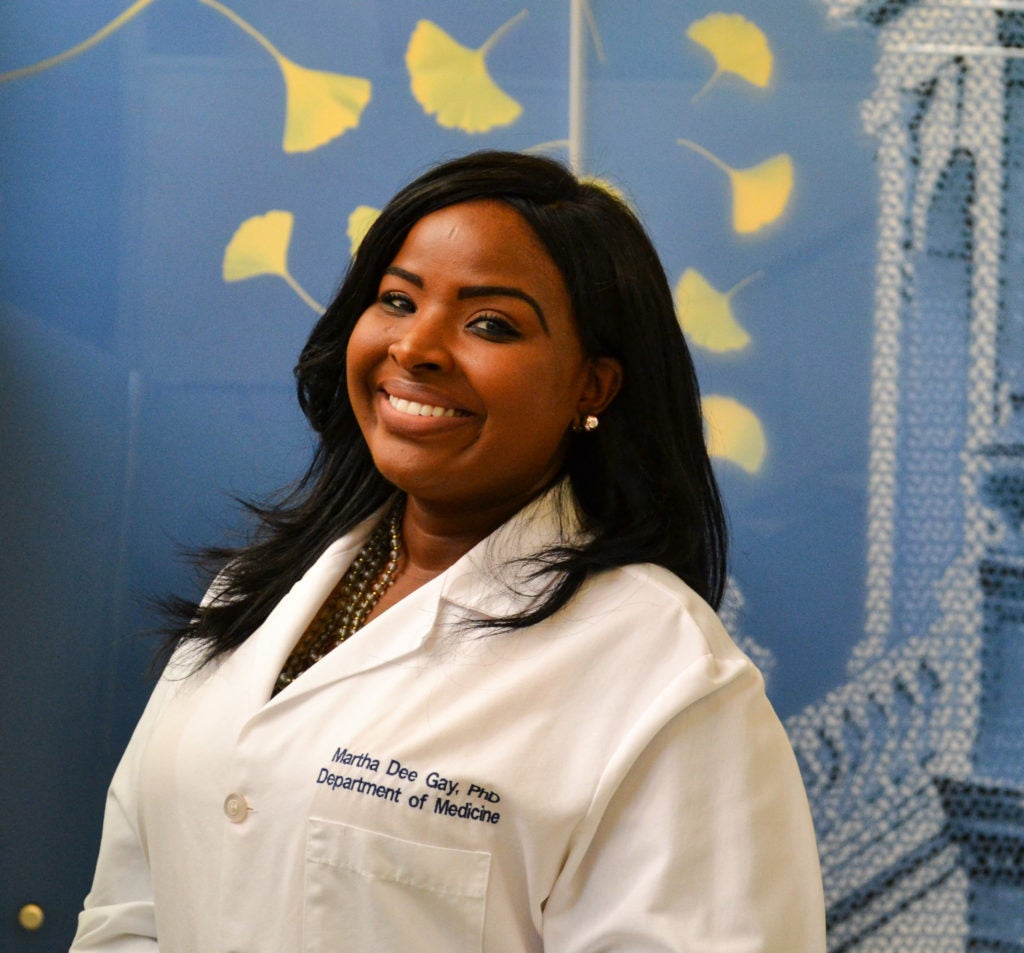
GHUCCTS Postdoctoral Research Fellow
“During my postdoc experience in Dr. Jill Smith’s lab, my scientific acumen is continuously being challenged and enriched.”
About Martha
Dr. Martha Gay is a Georgetown-Howard Universities Center for Clinical and Translational Science (GHUCCTS) Postdoctoral Research Fellow and is completing her training in Dr. Jill Smith’s laboratory in the Department of Medicine.
Briefly describe your postdoc research project.
I am in my second year of the NIH TL-1 GHUCCTS translational biomedical science program at Georgetown University. My research objective is to address the rising concern that the fastest growing cause of cancer-related death is liver cancer otherwise known as hepatocellular carcinoma (HCC). As a postdoctoral scholar, I am conducting research in the field of Gastroenterology and Hepatology in the medical department. Specifically, I am interested in reversing the terminal effects of Nonalcoholic Steatohepatitis (NASH). This type of cancer is at least partly attributable to the rising prevalence of nonalcoholic fatty liver disease and NASH. The onset of NASH can lead to an increase of cirrhosis, HCC, and indicative of a liver transplant. My approach is to study the mechanism through which a Cholecystokinin (CCK) receptor blockade can prevent NASH and NASH-induced HCC in mice on a high-fat choline deficient ethionine diet. Thus allowing the development of antagonistic strategies with the drug proglumide to decrease NASH and prevent or reversing cirrhosis of the liver, possibly inhibiting the progression to HCC
What Georgetown activities/programs have you participated in to enrich your training experience?
My training experience thus far has been pivotal in both my contribution to science and enhancing my professional development in the field of Hepatology research. Upon completing my first year in the TL-1 program I was selected to be the first NIH TL-1 Postdoctoral representative for all the NIH TL-1 Trainees in the country at the Association of Clinical and Translational Science 2019 conference. Moreover, I co-authored two papers entitled “A Cholecystokinin Receptor Antagonist Halts Non-alcoholic Steatohepatitis and Prevents Hepatocellular Carcinoma” published in the Journal Digestive Diseases and Sciences and “A Novel Cancer Vaccine to Gastrin, Polyclonal Antibody Stimulator, Decreases Pancreatic Cancer Metastases” published in the American Journal of Physiology-Gastrointestinal and Liver Physiology. Moreover, I was selected for the Women in Cancer Research Award at the 2019 American Association of Cancer Research Conference.
What key scientific/professional skills have you learned during your postdoc that will help you advance in your career?
During my postdoc experience in Dr. Jill Smith’s lab, my scientific acumen is continuously being challenged and enriched. However, my professional development has sharpened tremendously because of TL-1 GHUCCTS program. This is my first postdoc and I believe that having opportunities that are structured towards enhancing and exposing fellows to next step professions that expand beyond academia are important. For example, the program has scheduled Thursday evening workshops, which are instrumental in strengthening my grant writing and broadened my professional career outlook with a range of employment opportunities from guest speakers in various occupations. Additionally, learning and incorporating when to appropriately use Responsible Conduct of Research Training methods in research and compliance with NIH requirements for training grant recipients. Furthermore, the program also encourages fellows to participate in ground rounds, which exposed me to interdisciplinary translational biomedical science outside of hepatology.
